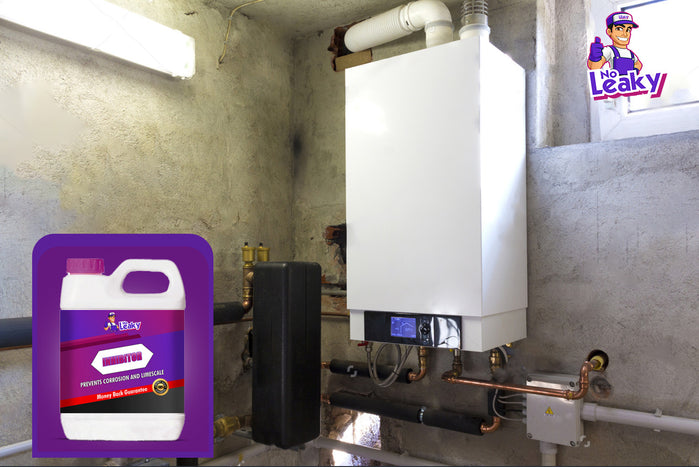How does a boiler inhibitor work to prevent corrosion?
A boiler inhibitor is an essential chemical added to the water of the central heating system to protect against limescale, corrosion, and sludge. These accumulations can lead to a reduction in energy efficiency, costly breakdowns, and excessive noise in your heating system. To avoid these problems, the use of a boiler inhibitor is recommended. This article examines the benefits of using this inhibitor, highlighting the features of the product marketed by NoLeaky, and provides advice on how to choose and effectively use a boiler inhibitor.
What is a boiler inhibitor?
A boiler inhibitor is a chemical added to the water of your central heating system to protect it against limescale, corrosion, and sludge.

Why use a boiler inhibitor?
Limescale, corrosion, and sludge can accumulate in your central heating system and cause numerous problems:
- Reduction in energy efficiency: Limescale and sludge insulate the walls of pipes and heat exchangers, making heating more difficult and increasing your energy consumption.
- Component corrosion: Corrosion can damage pipes, pumps, and other components of your boiler, leading to costly breakdowns.
- Excessive noise: Sludge can create obstructions in pipes, generating noise when water circulates.
Advantages of using a boiler inhibitor:
The benefits of using a boiler inhibitor are numerous, and it is essential to choose a product that meets your specific needs. Here are some general advantages you should look for when selecting a boiler inhibitor, highlighting the features of the inhibitor marketed by NoLeaky:
- Protection against limescale and corrosion: The boiler inhibitor protects your heating system by preventing limescale accumulation and corrosion, which can extend the life of your boiler.
- The only acid-free inhibitor: This means it is safer to handle and less likely to cause damage to your heating system or the environment.
- Ensures optimal boiler efficiency: By preventing limescale accumulation and protecting against corrosion, the boiler inhibitor allows your boiler to operate more efficiently, saving you money on heating costs.
- Anti-corrosion components: These components added to the inhibitor help protect your boiler's components from corrosion damage, extending its lifespan and reducing maintenance needs.
- Compatible with all materials: Whether your heating system is made of steel, aluminum, or other alloys, the boiler inhibitor can be safely used without causing damage.
- Helps prevent hydrogen formation: Hydrogen formation in your heating system can be dangerous. The boiler inhibitor helps prevent this formation, ensuring the safety of your heating system.
How to use a boiler inhibitor?
Using a boiler inhibitor involves several simple but crucial steps to ensure its effectiveness. First, prepare your heating system by cleaning it if necessary. Then, determine the appropriate amount of inhibitor to use according to the manufacturer's instructions and add it to the heating system, whether directly into the water tank or at a specific filling point. Let the system run to allow proper distribution of the product. Monitor the operation of your heating system for any potential issues and be sure to follow regular maintenance to maintain the effectiveness of the inhibitor. If you have any questions or concerns, don't hesitate to contact the manufacturer or a heating professional for assistance.
In conclusion, using a boiler inhibitor offers many benefits, including protection against limescale and corrosion, optimal boiler efficiency, increased safety, and compatibility with different materials. It is essential to choose a quality boiler inhibitor suitable for your heating system and carefully follow the manufacturer's instructions to ensure optimal results. With the right precautions and regular maintenance, the boiler inhibitor can help keep your heating system in good working order and prolong its lifespan.
In addition to the above information, here are some important points to remember:
- The boiler inhibitor should never be added directly to domestic hot water.
- It is important to follow the manufacturer's instructions when using a boiler inhibitor.
By taking care of your boiler and using a boiler inhibitor, you can extend its lifespan and reduce your energy bills.
